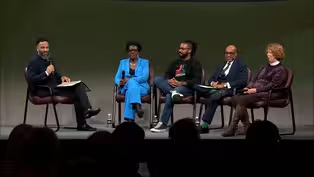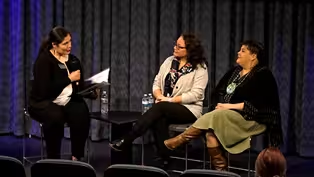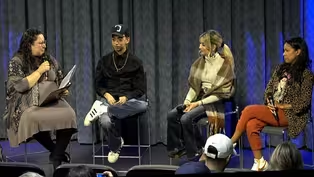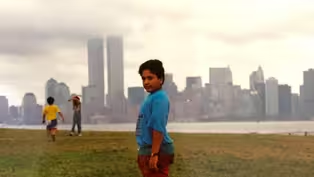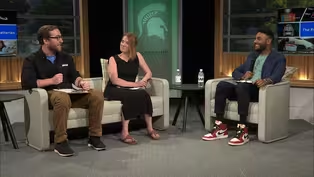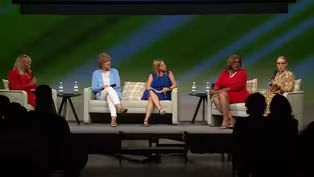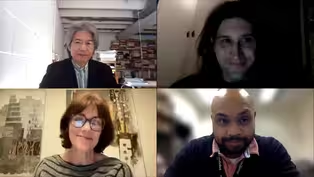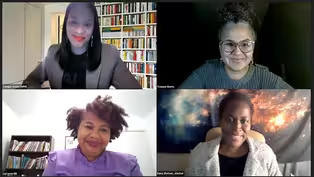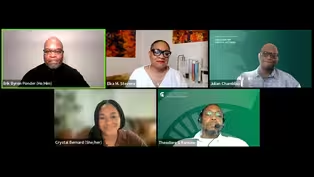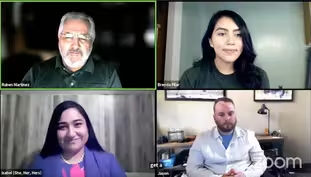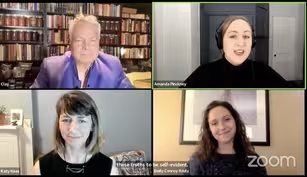
Panel Q & A - Afrofantastic
Special | 29m 6sVideo has Closed Captions
Panel discussion following the film Afrofantastic. Featuring filmmaker Julian Chambliss
Panel discussion following the film Afrofantastic. With panelists Teresa Goforth (moderator), director of exhibitions at the MSU Museum; Olivia “Liv” Furman, non-binary womanist, artist, educator, and researcher; Ytasha L. Womack, author, filmmaker, dancer, and independent scholar; and the filmmaker, Julian Chambliss, professor of English at Michigan State University. Recorded 6/15/23
Problems playing video? | Closed Captioning Feedback
Problems playing video? | Closed Captioning Feedback
WKAR Specials is a local public television program presented by WKAR

Panel Q & A - Afrofantastic
Special | 29m 6sVideo has Closed Captions
Panel discussion following the film Afrofantastic. With panelists Teresa Goforth (moderator), director of exhibitions at the MSU Museum; Olivia “Liv” Furman, non-binary womanist, artist, educator, and researcher; Ytasha L. Womack, author, filmmaker, dancer, and independent scholar; and the filmmaker, Julian Chambliss, professor of English at Michigan State University. Recorded 6/15/23
Problems playing video? | Closed Captioning Feedback
How to Watch WKAR Specials
WKAR Specials is available to stream on pbs.org and the free PBS App, available on iPhone, Apple TV, Android TV, Android smartphones, Amazon Fire TV, Amazon Fire Tablet, Roku, Samsung Smart TV, and Vizio.
More from This Collection
Panel discussions following WKAR film screenings. Featuring filmmakers, policy makers, community partners and more.
Panel Q & A - The Cost of Inheritance
Video has Closed Captions
Panel discussion following the film The Cost of Inheritance. (30m 59s)
Video has Closed Captions
Panel discussion following the film Warrior Lawyers. (33m 42s)
Panel Q & A – First Voice Generation
Video has Closed Captions
Panel discussion following the film First Voice Generation. (31m 2s)
Video has Closed Captions
Panel following the film "American Jedi." Discussion features the film’s producers. (48m 46s)
Panel Q & A – NOVA Science Studio Showcase
Video has Closed Captions
WKAR showcases highlights from the NOVA Science Studio project. (53m 35s)
Panel Q & A – Building the Reading Brain
Video has Closed Captions
Panel discussion following the WKAR original film, Building the Reading Brain. (36m)
Panel Q & A – Free Chol Soo Lee
Video has Closed Captions
Panel discussion following the film Free Chol Soo Lee. (29m 48s)
Panel Q & A - Storming Caesars Palace
Video has Closed Captions
Panel discussion following the film Storming Caesars Palace (25m 19s)
Video has Closed Captions
Panel discussion following the episode Afrofuturism, from the Artbound series (33m 56s)
Panel Q&A - Brenda's Story: From Undocumented to Documented
Video has Closed Captions
Panel discussion following the film Brenda's Story (25m 44s)
Panel Q & A - Benjamin Franklin
Video has Closed Captions
Panel discussion following the film Benjamin Franklin. (21m 46s)
Video has Closed Captions
Panel discussion following the film Unadopted. (31m 45s)
Providing Support for PBS.org
Learn Moreabout PBS online sponsorship- We're so glad you all were here with us to see that fantastic film.
It really was fantastic.
So now it's my pleasure to introduce our panel for this evening.
First of all, Julian Chambliss, professor in the English department at MSU and creator of "Afrofantastic."
Liv Furman, artist, educator, researcher.
And then on our screen there, we have Ytasha Womack, critically acclaimed author of the book "Afrofuturism: The World of Black Sci-Fi and Fantasy Culture," filmmaker, dancer, independent scholar, and champion of humanity and the imagination.
(crowd applauding) I love that.
So I think we'll start just with some general reactions to the film, and any of our panelists are welcome to start that off.
- I thought it was okay.
(audience laughing) - It's fine.
I was reading the script.
- No, obviously, I thought it was awesome.
This is a film that really is trying to speak to the contemporary Afrofuturist moment, and we were lucky for the opportunity to talk to people like Ytasha at an event where they're trying to define what Afrofuturism is, not just simply for that audience, but really perhaps summing up a kind of transformation that's taken several years to happen.
So it's great to sort of see that narrative being exposed to a general public who I think has a lot of questions about what is Afrofuturism.
- What I was really struck by was just one of the rallying factor nature of it, how much of it I identified with, and also was like learning from.
Also like a short note, I know we often talk about the fact that "Black Panther" is not the only Afrofuturist thing, Afrofuturist moment.
So it was good to see all the other mediums and conversations around it, but it also did remind me of the viewing of "Black Panther."
And we saw it here.
I don't know if anybody else was here, but BGSA did a late night watch when "Black Panther" came out.
And being in that space was incredible.
One, it was very different from being at any other space at MSU that I've ever been on, and it was so black, so exciting.
Like, we were screaming in that theater.
And something about that feeling is like what I've taken with me and just continuing to think about Afrofuturism is this like awakening, this aliveness, this communal moment where, you know, you get to see such fantastic things with other black folks and you see yourself represented in that in a way that's not just like informed by trauma and all these other things that often weigh on us from the day to day.
So seeing that in the documentary was great for me.
It brought back a lot of memories and also thinking about my own experiences of Afrofuturism and conversations and people who have informed them.
So, yeah.
- Ytasha, do you have anything you would like to add to that?
- Yeah, you know, it was fascinating just listening to it.
And having worked on the subject matter for a number of years, it was very cool to see colleagues who at one point in time you're having maybe more or less private conversations as you're helping to think about how to write these subject matters, and now we see we're in a documentary and many of us have a broader reach, and then just a conversation just amongst us with respect to talking about these theories and ideas.
So it really had me thinking about collectives and talking about the subject matters as collect in a community dynamic and how that shaping of this theory lent itself to building and collaborating and sharing with the others.
So that I find fascinating.
- Wonderful.
Well, I'm gonna move on to another question and we're gonna start with you, Liv, this time.
How does the idea of Afrofuturism tie into established black cultural practice?
- Well, overall I feel like, one, it's just like an outbirth of our identity, our experiences, things reflecting on, like, it's a outgrowth of black folk in a lot of ways.
I think for me especially, I think of Afrofuturism and I think of it as a tool for like reflection, of looking back, thinking about our elders, ancestors, our own personal past experiences, but also looking forward and thinking about and envisioning our own futures.
And in that sense, I feel like it's a manifesting tool as well in many ways.
Like, we're manifesting our future by thinking about these Afrofuturist possibilities.
And then as I'm saying that, I'm thinking of a conversation that I had with Samuella recently about the fact that when we're thinking about critical perspectives as black folk or even the work that I've done, like, with more decolonial lenses, focusing on that work often focuses on trauma.
It focuses on like the damage and the inequalities that we have experienced.
But, you know, focusing on like Afrofuturism as a topic, as an aesthetic, as a way of life, as a lens, allows for you to reflect on that and take that into account, but it kind of focuses on that fantastic, it focuses on the wonder, on these possibilities that are available to us.
And even, again, as an aesthetic and our music, things like that, like me myself, I feel like I take Afrofuturism into my everyday.
The fact that I'm here, you know, I have a doctorate and I am free, is wild.
And I think that there are...
I don't know, I try to meditate on that, and I think that that is a kind of a role of Afrofuturism in that sense, again, in terms of manifesting and healing, reflecting.
Yeah, I feel like I can go on and on about that, but I'll stop there.
- That's a good question.
Do either of our other panelists wanna respond to that or move on to?
- No, I think she said it all.
- Okay.
We just got a question from the audience.
Actually, two questions.
And the first one is, "With the rise of Afrofuturist works in the public eye, where do you see these works moving our nation toward?"
And then the second part of the question is, "In the documentary someone says, 'it takes strength to imagine yourself in the future.'
How do you see the theories impacting our youth who may struggle seeing a future because of their current place in society?"
I think that's an excellent question.
- I love that.
- Yeah.
- I think one of the things that is a common thread in a lot of the responses about futurism that we see and you hear people talk about is the way that it does inspire youth in particular to think differently and act differently.
And that's one of the ways that is manifests so much in popular culture because it's so accessible as a tool, and some of that is actually layered across different kinds of practice.
So you can think about some of the people who believe in Afrofuturism.
Looking to someone like Octavia Butler and sort thinking about the ways that, in the "Parable Series," the protagonist sort of prepares herself for talks about community or talks about the ways to rethink your practice or rethink the way you look at the world.
I think as a movement in particular, it does offer a kind of narrative that points to different paths.
And I think for me in particular, talking to people who have been writing about and thinking about Afrofuturism so long, they are really pushing for a kind of set of practices that can be adopted by everyone.
But at the same time, I think they recognize that they're centering their transformative power on the black community, right?
Because that community is under threat.
And so there's a kind of choice to be made.
And I think there's a recurring theme in Afrofuturism about making different choices.
Choices that are better, choices that emphasize community, choices that emphasize empathy, choices that emphasize care.
And that's a narrative that I think a lot of us can understand.
But in Afrofuturism, that's a really a central prism to understand what needs to change in terms of systems that we have.
And I think that's one of the things that makes it very powerful, very accessible, and one of the things that makes it a global phenomenon because a number of people around the world, regardless of circumstance, can be involved in that conversation.
- Yeah, and I think, too, that when I think about people who wrestle with issues around the future, you know, I like to remind them that the decisions you make today are usually based on what you think would happen in the future or what's likely to happen in the future.
And even if you say, "Well, I don't have a vision of the future," even if you don't have a clear vision, you do have some inkling or an idea or a vision of a future that people are pushing you towards, which may not be in line with how you see yourself.
So the act of thinking of a future informs the decisions that you make today.
So to that extent, you're informed by your futures (laughs) in the imaginative sense.
And then when you think about futures, past, and present kind of conflating or functioning as one, then you're also informed by these possibilities of what could happen in the future.
And I find that kinda empowering.
I think people, they can accept that there's a certain trajectory or continuum that they're a part of, that they could be informed by consciously or unconsciously, but we don't always think about being informed by a future.
I'd like to also remind people that to the extent you may or may not be thinking about a future, there are other people who are thinking of futures and have ideas about where you would fall in that future.
And so it's a benefit to have a relationship with the future because you have a right to shape futures as much as anyone else does, And I just encourage people to collaborate to do so.
But just to address your first question, which was about how is this sort of Afrofuturism impacting the nation, I would say that Afrofuturism is impacting how people are thinking about future studies and that it brings more narratives, more books, more works into the sci-fi canon for people to reference when thinking about futures.
But also I think it's kind of a reminder that some of the futures we've been seeing in some of our films for the past two decades or so have not been incredibly optimistic.
And there's an inherent optimism in Afrofuturism because it often thinks of ourselves as coming out of this interruption of enslavement or colonization.
- I love that, especially what you were saying about being informed by our futures.
I really appreciate that.
And what I was thinking of in how Afrofuturism impacts and informs our nation, our youth, is, one, inclusivity.
That was something a lot of folks in the video talked about.
And using Afrofuturism as a perspective and as a lens.
Like, it forces you to be inclusive 'cause you're reflecting on our own past of being marginalized and all this violence against like different bodies for these reasons.
So thinking about Afrofuturism informing a more inclusive future is something that really sticks out to me, and I think it's something that, you know, youth that I talk to today really hold onto that.
They're really about being themselves and being able to articulate who they are, name themselves, and I think that that is a lot of what Afrofuturism does and allows for us to do as well.
I think also Afrofuturism is very like communal.
It locates you within a community of being.
And as you're thinking about the aesthetics of Afrofuturism or the stories that come from it, I think community is always central to that.
Especially, like you were saying earlier about parable of the sword, parable of the talents.
I often say that I'm like molding my life after those texts, and it very much has inspired a lot of my adult life.
But central to those stories was the founding of a community like "Earthseed."
And for me it's always great whenever I talk to somebody else who've read Octavia Butler and you talk about "Earthseed."
And they're like, "Oh, yes, I'm part of gang."
And I'm like, "Yes."
And it is very communal in that sense and that like, if you know, you know.
And if that is something that your heart leans toward or lingers toward, it is something that can draw people together.
Also, in the documentary, it was like people from all walks of life.
It was like academics, you know, folks who were into graphic novels and comics and artists and community activists like youth.
Like, folks from all areas of life can identify with that, and it is a unifying force that can bring us together in ways that other things cannot.
And again, similar to, and I don't wanna say... "Black Panther" is not the only Afrofuturist moment, but again, we saw when it came out, everybody watched that.
It wasn't just the academic folks or whoever... Like, that was something that we can all hold onto.
And I think that, for me, the community aspect and also like the inclusive widening are things that Afrofuturism helps us think about in terms of like our nation as well as the youth.
- That's great.
I think this question goes in a very different direction from all of that, so it'll be interesting to see how you respond.
"Can you discuss the mainstreaming of Afrofuturism in the current context of national polarization around an already tepid DEI discourse?
(host laughing) I thought you'd laugh.
I know.
That's what I thought.
- So I think one answer to that question, of course, is the mainstreaming of Afrofuturism operates not just simply in the academy, but also in the community.
And so as a result, I do think... And this is a legitimate sort of intellectual question that I do think about.
As a academic discourse, how will Afrofuturism mature into a canon?
Like, how would it be sort of defined and understood?
And that's its own set of conversations because you have people like me and other people who are studying Afrofuturism.
And Afrofuturism is as matured in a way, and one of the things that's really interesting to me personally, one of the reasons I wanted to do the documentary is that I saw the Carnegie Hall event as a sign of maturity.
It's a sign that, basically, white people like, "Hey, Afrofuturism, wow.
What are we gonna do with this?"
And they're having to come to terms with what is clearly a movement culture that cannot be denied, right?
It cannot be denied.
So, over the last four or five years, there have been a number of what I would describe as consistently institutionalized narrative attached to Afrofuturism, and those will continue.
And most likely, theorizing here, they will start to coalesce around some particular narrative that I don't wanna like be on film saying, it's gonna be this, and it goes another way.
But I think they're gonna coalesce around certain kinds of narratives.
But at the same time, this is a community movement.
This is a movement of the grassroots.
This is a movement of artists, of activists, of people who believe in things like equity, that believe in things like uplift.
And it is something that offers a very pointed critique of the failures of the system.
And the fact of the matter is, part of the reason our futurism has been so successful right now is that everyone recognizes this system is failing, period.
Like, you can dance around it, but there's a real sense coming during the pandemic and continuing right now that our system is under stress, and those stresses are fundamental and we need some kind of different ideology to get to a better future.
And Afrofuturism is essentially that.
It offers up a pathway to something that is better.
As I said before, choice is central to that.
And what Afro futurists are advocating for is choosing a path that is better and they're choosing to create communities that will act on that path.
But I sometimes joke when I teach my class on Afrofuturism, which, yes, it's called "Afrofantastic."
I'm a one trick pony.
Choice is what defines systems.
We all make choices, and Afrofuturism is a philosophy that you can choose to follow, just like there are a lot of philosophies you have no real deep connection to, but you choose to follow.
Capitalism is philosophy.
You choose to follow it.
You could choose to follow it in many different kinds of ways.
So, it's this movement culture that is, in some ways, transnational appealing to a number of different people across their experience going to continue to be a grassroot thing that transforms?
Yes, it will.
How that will manifest itself is not yet clear.
But I do not believe that it will stop just because the academic narrative has being crystallized and being promulgated across books and things like that.
It does not exist totally in academia, not just simply ivory tower.
It is a set of action and practice that matter to people and they will continue to pursue it.
- And I can say... Oh, I thought someone gonna speak.
Oh, well, I just wanted to say that I think one of the beauties of Afrofuturism is that, for some, in an intra community way and people who aligned with ideas that we now call Afrofuturist, it gave them a language to aggregate these ideas.
So, you know, there were people who saw an artist like Sanra perform, maybe they heard his music, they weren't quite sure what kind of context to put it in.
Or maybe they really knew Sanra but they didn't know about Mae Jemison or the legacy of black astronauts.
Or maybe they knew about the legacy of black astronauts, but they didn't know about black sci-fi literature.
They knew about black sci-fi literature, but they didn't know about African metaphysics, right?
So this framing of Afrofuturism kind of creates a platform for people to see the relationships between all of these ideas and to discuss them publicly without feeling like they're on the fringe, which I think is very key.
The naming of Afrofuturism I think was very empowering for many people because it gave them a banner to identify the things they were thinking about and also a reference to a canon and a community of people who were wrestling with these ideas in their own way.
- Liv, do you have anything you wanna add to that?
- Could you read the question again?
- Sure can.
"Can you discuss the mainstreaming of Afrofuturism in the current context of national polarization around an already tepid DEI discourse?"
- Okay.
'Cause I think when you initially read it, my mind went straight to all of these laws that are happening right now that is like banning critical race theory in schools and things.
And I'm like, you know, Afrofuturism has its roots and like critical discourse within the black community, so I feel like those things are connected.
I think the popularization or mainstreaming of Afrofuturism, like, you have to be aware of these other things that are happening too, and, like, you can't unconnect them.
And I think...
I don't know, it's very interesting to me seeing those things written into law as like being not allowed.
When I start seeing Afrofuturism start being in those writings, that'll be a whole different wave.
But I feel like it's only a step away in that sense of, again, having roots in the same critical conversations.
I feel like, for me, even this conversation has made me see how Afrofuturism informs our current activism, our practice of being.
Like you were saying, Ytasha, thinking about the future informing our current actions.
And I feel like in that sense, the mainstreaming of Afrofuturism has actually given a lot of folks some political actions that they can do in their present in order to liberate themselves, heal themselves, live their free best life and reclaiming their own histories and identities.
And I really appreciate that.
I feel like, I guess, I lee away from the popularization of like the black...
The kind of like capitalist notions of consumption of people just liking it to see because it's entertaining.
I feel like that, if we just lean into that, and then we're missing kind of the whole point of it all.
I feel like I wanna go on a longer tangent, but I feel like those things are connected.
I don't know if I have a whole thesis to say about it, but I think that our awareness of these things happening at the same time and our experiences of it in this moment is very important for us to reflect on now and in the future.
- Yeah, the other thing is, Afrofuturism is so complicated that I feel like a lot of people, it's difficult for people who are passing like, you know, critical race theory thing.
Like, I had a colleague who who studies Afrofuturism and he's like, he literally said, "I'm not gonna run into this because somebody knows what I'm doing."
Like, they wanna ban critical race theory.
They don't know what Afrofuturism is, they're fixated on this thing over here.
I've been doing...
I'm teaching all these classes, they just don't know.
And I was like, that is a legitimate point, right?
A lot of people do not know what you mean when you say Afrofuturism.
The hope is that, for the documentaries, to sort of try to clarify what it means, but it is so much to so many people that it's harder to pin down than say, you can't just sort of like coin a phrase like, "Oh, that's what Afrofuturism is."
No it's not.
It's a epistemology, it's a worldview.
So it's a lot harder to pin down, and that may in fact give Afrofuturism a very longer line before it can be sort of reigned in in an academic or reigned in in the kind of politics of identity that is so central to our current political debate.
- I know we're at the end of our time, but I really wanna ask this one last question of all of you 'cause I think it's important and will be fascinating.
And short an answer as you can give, which clearly with Afrofuturism, is not an easy thing to do because there's so much to say.
But what does it mean to you to live in an Afrofuturist world?
- I'll go then.
What does it mean for me to live in Afrofuturist world?
One, the first thing that came to my head was Janelle Monae's "Age of Pleasure" album that just came out.
I feel like all of that is so Afrofuturist in aesthetic and vibes and just the being of it and able to be free and focusing on a future that has pleasure in it, has joy in it, has fun, has community in it.
Especially as a non-binary person myself, and Monae identifies similarly, being able to see someone like that in my now is very much what it means to be in an Afrofuturist space.
For me, again, the aesthetics of it, as well as the things that she talks about and the critical ways that, you know, they embody themselves.
Like, all of that is the part of Afrofuturism that is like the most exciting to me as a lived experience.
- I'm gonna let Ytasha go.
- You're gonna let Ytasha go?
All right, Ytasha, Julian said, it's all you.
- I think being in the Afrofuture now is about recognizing that you're informed by your futures and these trajectories of time, and making decisions that value humanity, value our earth, value the larger universe, and recognizing that you are in this universe, in this space and time, for a reason.
There are things that you can contribute and do that are unique and special to you that explains why you're here in this time versus why you weren't here a hundred years ago or 500 years ago in the same body, in the same way.
So there's a nowness, you are very much in someone's future, you're in your own future.
And I think as we sort of recognize these streams of time, it enriches the path that we're on.
- You ready now?
- No, not really.
I'm gonna follow Ytasha.
I think the thing I would say is that we all benefit from the legacy of black speculation around liberation.
And what the Afrofuturist world really calling attention to is that legacy is still alive, right?
That the future is not guaranteed to be anything, but we know from past action that it could be made better.
And those choices around what it takes to make it better are really at the core of Afrofuturism.
And really, that's the core of the message of Afrofuturism is to appeal.
I would argue that the reason that this moment is so manifest for so many people is that the need for Afrofuturism is so very clear.
Even if they don't know the...
Even if they don't understand the term, they understand the intent.
And that element of the need for transformation is what makes sort of Afrofuturist world so dynamic and so appealing right now.
And I think that's a lesson that we continue to learn from every day.
- Beautiful.
Well, that is all of our time for this evening, so we wanna thank our panelists, first and foremost, and then we wanna thank all of you for being here with us.
And if you'd like to share this film with friends and colleagues, please let them know that "Afrofantastic" airs on WKAR TV on Monday, June 19th at 2:30 and 10.
Streaming will be available on Tuesday, June 20th, at pbs.org and the PBS video app.
Events like this from WKR are made possible with support from people like you.
Thank you to those who have donated to WKAR, and thank you and have a wonderful evening.
(crowd applauding)
Support for PBS provided by:
WKAR Specials is a local public television program presented by WKAR
